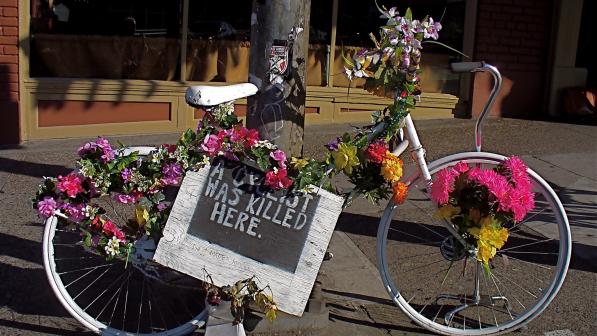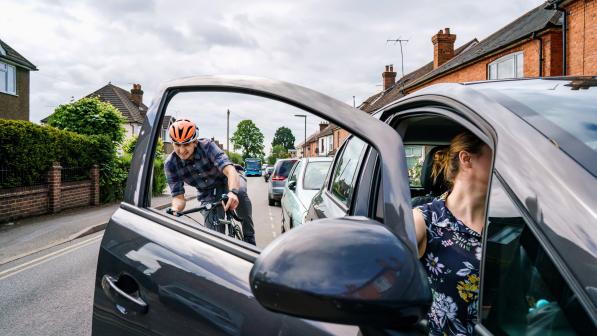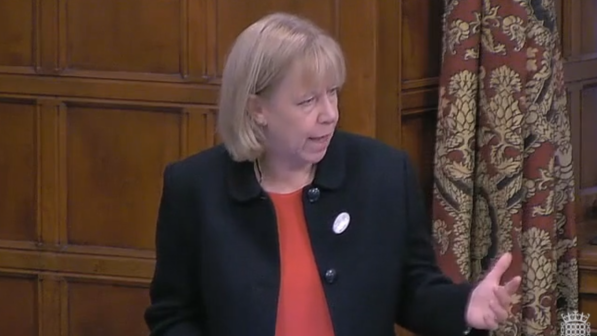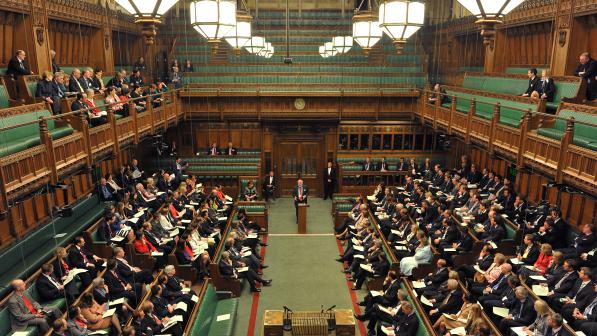Government finally thinking about tackling road injustice

***Update 15 December: Since this article was written on 6 December, the Government has now confirmed that it is "scoping out" a call for evidence on parts of the Road Traffic Act. In other words, it is no longer just "considering" carrying out the review of road traffic offences and penalties that it promised in 2014 - it is now actively working on it.***
Last week, I reported on a powerful Lords debate on 'Road Justice' which took place last Monday, 8 November. Peers from across the political spectrum were echoing the calls from Cycling UK and our allies, for the government to carry out the full review of road traffic offences and penalties that it promised in 2014, and to address the issues highlighted in our report Five Flaws: Failing Laws outlined in last week's blog.
I said in that article that the debate overall had generally been very positive - apart from the persistent ministerial rejections of our proposals.
However, I also said that the Commons would be debating these issues again, precisely a week later, 15 November. This debate was held in response to two parliamentary petitions ('Tougher sentences for hit and run drivers who cause death' and 'Ryan's Law: Widen definition of 'death by dangerous driving''), both of which had been launched by the bereaved families of young men who had been killed by 'hit-and-run' drivers.
Both petitions attracted over 100,000 signatures, hence a parliamentary debate was long overdue. A third petition on the same issue is still live and has attracted over 24,000 signatures.
All three petitions share a common concern. The maximum penalty for 'hit-and-run' offences is 6 months custody. That may be adequate for those who scratch another person's parked car, but not for those who leave a victim for dead in the road.
We know that sometimes drivers flee the scene of such collisions in a blind panic. Too often though, they are trying to hide the fact that they were driving while unlicenced, uninsured, disqualified, drunk, or on drugs.
Whatever their motive, their failure to call the emergency services effectively denies their victims the chance of life-saving treatment, and can instead condemn them to die.
For such offences, a six month maximum penalty is surely grossly inadequate.
Harrowing stories
During Monday's Commons debate, we heard several harrowing stories of families whose bereavement has been compounded by the legal system's grievous failings. Some of those families were in Westminster Hall to hear the debate.
Christina Rees MP (Labour, Neath) opened the debate by outlining the stories of the families who had brought the petitions.
Mathew Smyth was killed at 3am on 25 August 2018 when a delivery van driven by Ricardas Tarasca pulled out of a side-road into the path of his motorbike on the A1307 in South Cambridgeshire.
Tarasca fled the scene before calling his company to say that his van had been hit in collision with a deer - even though Mathew had been thrown onto his bonnet.
Still, the company sent him a new van, he finished his delivery round and then went to bed, before the police caught up with him. He later admitted causing death by 'careless' driving and failing to stop or report the collision.
For this he received a 14 month sentence and a 31 month driving ban. Mathew never got to know his then unborn daughter, who is now two-and-a-half years old.
Nine months later, Mathew's close friend Paul Wood was killed nearby in similar circumstances, in the early morning of 24 May 2019. He too, was riding his motorbike when a Range Rover pulled out on him.
A witness said that the driver, Heath Cooksey, had alcohol on his breath. But Cooksey fled, returning home to Romford in Essex, went to the pub and got drunk before handing himself into the police.
It was therefore impossible to gather evidence of whether he had been drunk at the time ot the collision, though he admitted having drunk heavily the night before.
Cooksey had been banned from driving a month previously, and had previous convictions for drink-driving and dangerous driving. Yet his sentence for causing death by 'careless' driving, causing death while disqualified from driving and causing death while driving uninsured, was three years’ imprisonment and a four-and-a-half year driving ban. In my view, this is surely a case where the offender should never be allowed to drive again.
Mathew and Paul's families have set up the Road Injustice Project, seeking to reform this area of the law. I want to pay tribute to their fortitude, and the bravery of their campaigning.
The second petition was tabled by the family of Ryan Saltern, a postman from Probus in Cornwall. Ryan was walking to a party when he was hit by driver Wayne Shilling, who had been drinking at a village carnival (as had Ryan).
Instead of stopping, Shilling drove on, dragging Ryan's body along under his car - this was later proved to have caused his death.
It was only when Shilling's father reported him to the police, 36 hours later, that they learnt of Shilling's involvement in the crash. By this time, it was too late to carry out toxicology tests. Shilling received a four month suspended sentence and a 12 month driving ban.
Before Christina Rees concluded her speech, Peter Dowd MP (Labour, Bootle) rose briefly to explain how his daughter Jennie had been also been killed by a hit-and-run driver 13 months ago. The driver had received a 12 month sentence but was appealing it, in the belief that this is excessive.
Dowd urged that, "At the very least...sentencing guidelines need a full, thorough and substantial review, to assure families left bereft that justice is done."
Let me take this opportunity to commend his dignity in speaking up as he did, both in this debate and in a previous press statement.
Everyone agrees...
The next speaker was Ryan Saltern's constituency MP, Cherilyn Mackrory (Conservative, Falmouth and Truro). Like Christina Rees, she had met Ryan's family and had read their collection of stories which were similar to Ryan's. She said, "I am sorry to say that this is not an unusual situation, however shocking these stories are. I am afraid to say that they are all too common."
She is right. Other cases include Sean Morley, Ben Regan, Alfie O’Keefe Hedges, Oscar Seaman and Scott Walker to name but a few. All are harrowing in their different ways.
During the rest of the debate, we continued to hear of similar stories. Robbie Moore MP (Conservative, Keighley and Ilkley) spoke of the death of nine-year-old George Lewis on 18 September.
Tahir Ali (Labour, Birmingham Hall Green) cited two cases in his constituency. A three-year-old girl (who has since been named as Maysoon Adbul-Hakeem) had been killed only last Thursday, 11 November.
Just over two months ago, Ali's next door neighbour, bus driver Ghulam Nabi, 61 was killed by an unlicensed and uninsured driver who was speeding at 53mph on a 20mph street. The driver, who admitted causing death by dangerous driving, will serve 44 months in a young offender institution and a 58 month driving ban for this offence, but no additional penalty for driving without insurance.
There was support too, for calls for action made by Cycling UK and our allies. Ben Bradshaw (Labour, Exeter), repeated his (and our) call for the full promised review of road traffic offences and penalties, and specifically for stronger penalties for serious 'hit-and-run' offences and for action to close the 'exceptional hardship' loophole, whereby drivers routinely avoid driving bans by claiming that this would cause 'exceptional hardship.
Jim Shannon (DUP, Strangford) cited Cycling UK's briefing, outlining why the government limited proposals put forward in its Police, Crime, Sentencing and Courts (PCSC) Bill could have adverse unintended consequences. He declared his support for Ben Bradshaw's amendments, as did SNP transport spokesman Chris Stephens MP.
Ruth Cadbury (Labour, Brentford and Isleworth), co-chair of the All Party Parliamentary Group on Cycling and Walking (APPGCW) referred to the APPGCW's inquiry report on Road Justice, and cited the full range of amendments that Cycling UK has urged Parliament to make to the PCSC Bill. Labour transport spokesperson Kerry McCarthy MP echoed our call for a full review of road traffic offences and penalties.
... but the minister keeps us waiting
Then came the turn of transport minister Andrew Stephenson to respond to the debate.
The bereaved families must have been aghast as he spent the first ten minutes of his speech dismissing the law changes that they, Cycling UK and others have been calling for as being either unnecessary or impossible.
He argued that other offences were already available in most 'hit-and-run' cases. He then claimed the number of cases where the only offence for which there is evidence is the driver's failure to stop and report the collision is "extremely small" - despite the dossier of such cases compiled by the bereaved families.
He went on to argue that increasing the maximum sentence for 'failure to stop and report' offences, even in limited circumstances where there has been a serious or fatal injury, "cuts across the basis for this offence." That excuse for inaction can only have been written by a civil servant. I doubt the Minister even knew what it meant (I certainly don't).
He also argued that this proposal "could risk creating an unfairly severe offence", adding that it "would create serious anomalies with other offences, which could result in potential injustices." As if the existing legal framework, and the government's amendments to it in the PCSC Bill don't already do that.
A long-awaited half-promise that could make a huge difference
But then, just when I was feeling really angry - and I cannot imagine how the bereaved families were feeling at this point - the minister changed his tone.
He said that "the government are not dismissing the concerns that have been raised." He then acknowledged "that there might be something wrong with the law as it stands; it may not be working as well as it should in this area."
He informed MPs that Department for Transport officials "have been exploring options that could be pursued in this area", and that "The Department is considering conducting a call for evidence on parts of the Road Traffic Act. Although details are still being worked on, I expect this will include failures to stop and report as an offence."
Hallelujah! Seven years after promising a review of road traffic offences and penalties, officials are finally working on the scope of this review. The government may only have moved a few millimetres, but the door is definitely now ajar.
Update and next steps: Government confirms it is actively working on the review
Since writing this article, the Lords have held a further debate on the road safety-related amendments to the PCSC Bill, proposed by Cycling UK and our growing circle of partners (see our joint Lords briefing - n.b. road safety charities PACTS and Brake are now on board, as is the RAC). Let me take the opportunity to thank Lord Berkeley (Lab), Baronesses Randerson (LibDem) and Baroness Jones (Green) for tabling these amendments, likewise to Lord Attlee (Con) and Lord Hope of Craighead (Crossbench) for their supportive comments during the debate.
In response, both Government ministers Lord Sharpe of Epsom and Baroness Williams of Trafford (and again) confirmed that the Department for Transport is now working out the scope of a 'call for evidence' on parts of the Road Traffic Act, and would "welcome suggestions on what issues could be tackled". In other words, it is now finally working on the review of road traffic offences and penalties, that it promised back in 2014!
Cycling UK will now work with our partners to put forward our suggestions on the scope of the review. Suffice to say that our proposals will include the issues raised in our Five Flaws: Failing Laws report, plus a number of others that we and our partners have raised during the debate so far.
We also need to make sure Ministers know they can’t quietly kick this review into the long grass, as they did after making their original promise in 2014. We therefore need as many MPs as possible to ask Ministers to clarify the timescales for this review and to put forward suggestions on what it should cover. Please email your MP.
After all, this isn't just about securing justice for seriously injured and bereaved crash victims, vital though that is. It is also about taking unsafe drivers off the road. Along with safe infrastructure, this could play a hugely important role in maximising the health, environmental and other benefits of walking and cycling.





